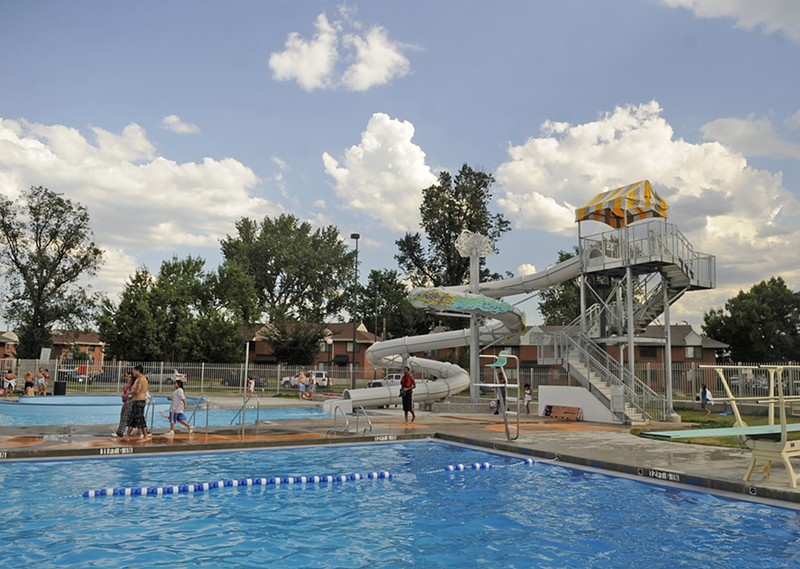Looking for a place to take a dip this summer? You might want to double-check that your neighborhood or apartment swimming pool is safe before diving in.
The City of Denver is currently working to get all pools properly licensed — with at least sixty addresses that once had public pools no longer licensed, according to the Department of Excise & Licenses.
“The city has identified [swimming pools] as a public-safety risk and in need of efforts to improve the licensing compliance rate,” says Eric Escudero, communications director for Excise & Licenses. “We want people to have lots of fun with the start of summer coming, but we most importantly want to make sure pools are safe.”
All pools that aren’t on private residential land — belonging to a single residence — are required to be licensed and inspected by the Denver Department of Public Health & Environment. The city suspects that many local pools that were temporarily closed during the pandemic never reapplied for licenses after reopening.
“We don’t have an estimated compliance rate for this license, but we have at least sixty addresses that formerly had licensed public pools in the city that no longer have an active license,” Escudero says.
There are 215 swimming pool licenses in Denver right now — down 20 percent from pre-pandemic numbers. Without proper licensing and the inspection that comes before a license can be issued, officials warn that pools could prove dangerous.
At the 7575 Town Center Apartments, for example, the pool has been closed intermittently because of unsafe pH levels.
“Poorly maintained swimming pools can pose a number of public health and safety risks, including the growth of harmful bacteria and the potential for accidents such as slips, falls or entrapment,” notes Amber Campbell, DDPHE public information officer.
According to Campbell, the city strives to inspect all pools twice a year when resources allow, and all are inspected at least once a year. During these inspections, DDPHE checks for water quality, safety equipment, general cleanliness and pool equipment quality. Temperature, emergency alarms, chemical storage, and rescue hooks and rings are all considered in the process.
The inspection, particularly of safety equipment, aims to make sure that pool operators are prepared for the worst-case scenario: someone drowning.
“In those rare cases, every second counts,” Campbell says. “Safety equipment that has been removed, damaged, is insufficient or is found to be inoperable cannot help anyone.”
The inspections help pool operators in other ways, too.
According to Campbell, inadequate pool maintenance can lead to mechanical problems with pumps, filters or other plumbing equipment, which can be difficult and costly to repair. Regular inspections help identify potential problems before it's too late.
The city is currently calling on pool operators to get their licenses before the summer swimming season really starts. It plans to begin the process with apartments and condos through an informational campaign that will let residential rental license holders know about the need for proper licensing.
“Anytime the city does proactive enforcement with required licensing, we always attempt education first,” Escudero says. “Issuing fines and citations is a last resort after we have done everything we can to inform.”
Still, the city is likely to start issuing notices of violation in the coming weeks. A license costs $100 for an application fee and then either $200 or $400, depending on how many months the pool is open. Fines for not getting licensed start at $150 and can increase up to $999 if the pool operator refuses to get in compliance.
Licenses must be displayed at all times, so swimmers can check to see if the pool where they’re planning to do that cannonball is licensed and safe.
[
{
"name": "Air - MediumRectangle - Inline Content - Mobile Display Size",
"component": "12017618",
"insertPoint": "2",
"requiredCountToDisplay": "2",
"watchElement": ".fdn-content-body",
"astAdList": [
{
"adType": "rectangle",
"displayTargets": "mobile"
}
]
},{
"name": "Editor Picks",
"component": "17242653",
"insertPoint": "4",
"requiredCountToDisplay": "1",
"watchElement": ".fdn-content-body",
"astAdList": [
{
"adType": "rectangle",
"displayTargets": "desktop|tablet"
},{
"adType": "rectangle",
"displayTargets": "desktop|tablet|mobile"
}
]
},{
"name": "Inline Links",
"component": "18838239",
"insertPoint": "8th",
"startingPoint": 8,
"requiredCountToDisplay": "7",
"maxInsertions": 25
},{
"name": "Air - MediumRectangle - Combo - Inline Content",
"component": "17261320",
"insertPoint": "8th",
"startingPoint": 8,
"requiredCountToDisplay": "7",
"maxInsertions": 25,
"watchElement": ".fdn-content-body",
"astAdList": [
{
"adType": "rectangle",
"displayTargets": "desktop|tablet"
},{
"adType": "rectangle",
"displayTargets": "desktop|tablet|mobile"
}
]
},{
"name": "Inline Links",
"component": "18838239",
"insertPoint": "8th",
"startingPoint": 12,
"requiredCountToDisplay": "11",
"maxInsertions": 25
},{
"name": "Air - Leaderboard Tower - Combo - Inline Content",
"component": "17261321",
"insertPoint": "8th",
"startingPoint": 12,
"requiredCountToDisplay": "11",
"maxInsertions": 25,
"watchElement": ".fdn-content-body",
"astAdList": [
{
"adType": "leaderboardInlineContent",
"displayTargets": "desktop|tablet"
},{
"adType": "tower",
"displayTargets": "mobile"
}
]
}
]











